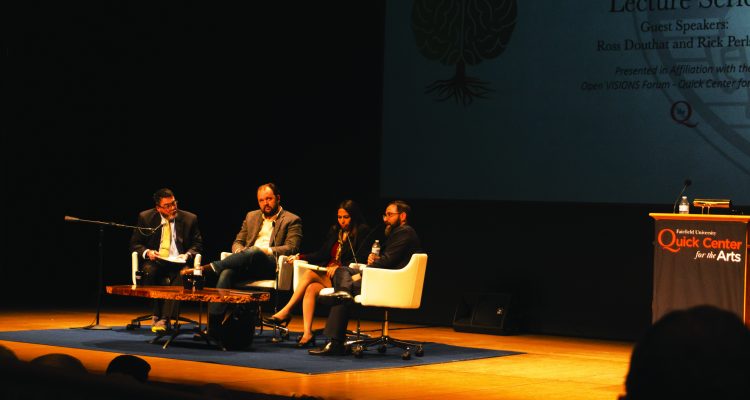Two opposing writers engaged in a civil dialogue about the State of the Union during an Open VISIONS Forum at the Regina A. Quick Center for the Arts on Tuesday, Feb. 5. Occurring hours before President Trump was to address Congress with the official version, the conversation between Ross Douthat and Rick Perlstein extended past the scheduled time with both speakers fighting to make their points. The leading intellectuals went back and forth over whether or not the American empire is in a state of crisis or a stasis.
Along with an in-depth discussion of the current political equation and where we are headed, the theme of the event was part of the Common Ground Lecture Series lead by Richard A. Greenwald, Ph.D., dean of the College of Arts and Sciences. According to Greenwald, civil discourse is extremely important and intertwined with the history of the higher education mission. He opened the event by discussing the potential to disagree wildly while having a good time doing and learning in the process. The message was to get away from the TV and to hear real thinkers, leaders in their fields.
Douthat is a conservative columnist for the New York Times who covers controversial topics such as politics, religion, moral values and higher education. Douthat made the case that what we may be witnessing in this polarized political environment is actually a “deep frustration with a political system incapable of rapid changes.” He argues that neither party currently has the capacity to govern. Despite the wild swings and charged rhetoric, very little has happened in either the Obama or current administration.
Perlstein is an American historian with three bestselling books chronicling American conservatism. A virtual encyclopedia of the history of American politics, he jokes that the source of his knowledge is “reading columns from 30 years ago and finding all the ways they were wrong.” He argues that far from being locked in a stalemate, there is a force bubbling right underneath the surface that is about to break it. He cites new forces rising in American politics such as Congresswoman Alexandria Ocasio-Cortez, the junior U.S. Representative from the Bronx.
After initial speeches from the guests, the event turned to debate. Perlstein continued to assert that the new faces and new forces rising is an indicator of a big change to come. Douthat fired back that two recent major events, 9/11 and the Financial Crisis of 2008, were not even enough to shift the American political field left or right. Both speakers seemed to agree that the two party system is entrenched and cannot split. It is changing, but from within the parties. The event moved to a question and answer session with the audience.
During the course of the discussion a number of controversial topics were discussed. Issues such as identity politics, media in the 21st century, cultural differences, everything shaping American politics and culture. Questions from audience members reflected the importance of the topics and ranged from how it would be possible to fix any problems with the “serious flaws in the U.S. Constitution” to questions about how truth can be found in an environment dominated by identity politics.
The event ended with an optimistic last word by Douthat, who emphasized the importance of civil dialogue and finding common ground. He stated that the old history of news in America was that of “big city newspapers speaking with voices of authority” but has moved to a factionalized media with a certain amount of “fake news.” He suggested that it is the nature of democracy to produce fake news and that this country has survived up until now in that environment. Ross Douthat and Rick Perlstein did agree on one thing: to show up and engage in a conversation at the Quick Center in front of an eager audience, getting closer to the truth in a rewarding civil manner.


You did a nice job, Matthew. Thanks for a good report.